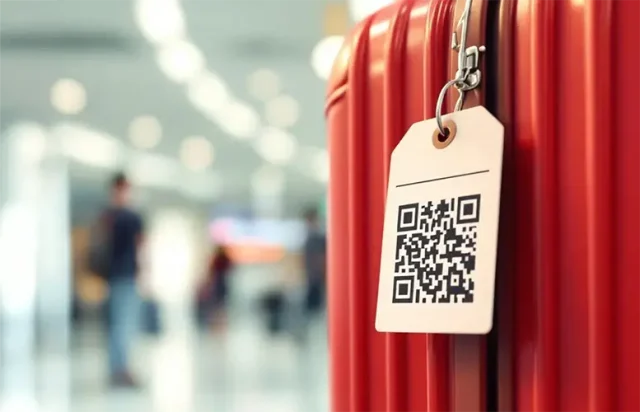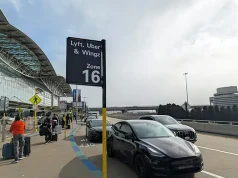
Traveling can be stressful, especially when it comes to keeping track of luggage. Traditional luggage tags have long been the go-to solution, but they have their limitations. Enter QR code luggage tags, a modern alternative that’s changing the game for travelers worldwide.
QR code luggage tags offer enhanced security and convenience compared to traditional tags. These digital identifiers store more information and are harder to tamper with or remove. By simply scanning the QR code with a smartphone, airport staff or good Samaritans can quickly access the owner’s contact details, making it easier to reunite lost bags with their rightful owners.
Low-cost QR code luggage tags are becoming increasingly popular among savvy travelers. They’re durable, water-resistant, and can be easily updated if contact information changes. This technological upgrade to luggage identification not only streamlines the process of locating misplaced bags but also adds a layer of privacy, as personal information isn’t openly displayed for anyone to see.
Key Takeaways
- QR code luggage tags store more information securely than traditional tags
- Digital tags allow for easy updating of contact details and improved privacy
- QR technology streamlines the process of reuniting lost luggage with owners
The Advantages of QR Code Luggage Tags
QR code luggage tags offer significant benefits over traditional tags, enhancing security, efficiency, and convenience for travelers. These smart tags revolutionize the way we handle and track our belongings during trips.
Enhanced Security and Privacy
QR code luggage tags provide a higher level of security and privacy compared to traditional tags. They store contact information digitally, keeping it hidden from prying eyes. Travelers can update their details remotely, ensuring accuracy without replacing physical tags.
The encrypted nature of QR codes makes it difficult for unauthorized persons to access sensitive information. This feature significantly reduces the risk of identity theft or misuse of personal data.
In case of lost luggage, only authorized personnel can scan and decode the QR code, maintaining privacy while facilitating the return process.
Streamlining the Check-In and Baggage Claim Process
QR code tags greatly improve the efficiency of airport operations. During check-in, staff can quickly scan the code to retrieve all necessary information, reducing processing time.
At baggage claim, QR codes enable faster identification and verification of luggage. This speeds up the collection process and minimizes the chances of mistaken bag pickups.
Airlines can use QR codes to track baggage throughout the journey, providing real-time updates to passengers. This transparency enhances the overall travel experience and reduces anxiety about lost items.
Convenience for a Seamless Travel Experience
QR code luggage tags offer unparalleled convenience for travelers. They eliminate the need for repeatedly writing contact details on paper tags or replacing worn-out labels.
Travelers can easily update their information through a linked app or website. This flexibility is particularly useful for frequent flyers or those with changing contact details.
The durability of QR codes ensures they remain readable even after exposure to harsh handling conditions. This reliability provides peace of mind throughout the journey.
QR tags can store additional information such as flight details, accommodation addresses, or emergency contacts, making them a comprehensive travel tool.
Technical Innovation in Luggage Management
QR luggage tags represent a significant leap forward in baggage handling technology. These smart tags combine digital information with physical tracking to enhance efficiency and convenience for travelers and airlines alike.
Real-Time Tracking and Dynamic Information
QR codes on luggage tags enable real-time tracking of baggage throughout its journey. Airlines can scan the code at various checkpoints, updating the location instantly in their systems. This reduces the chances of lost luggage and allows passengers to monitor their bags’ whereabouts via smartphone apps.
Dynamic QR codes take this a step further. They can be updated remotely, allowing for changes in flight information or destination details without replacing the physical tag. This flexibility proves invaluable during unexpected travel changes or layovers.
For airlines, these tags streamline the check-in process and improve baggage handling efficiency. The quick scan of a QR code provides immediate access to all necessary routing information.
The Role of Smart Luggage Tags in Modern Travel
Smart luggage tags with QR codes are transforming the travel experience. They offer a blend of security and convenience that traditional paper tags cannot match. Travelers can store extensive contact information, including multiple phone numbers and email addresses, enhancing the chances of reuniting with lost luggage.
Some smart tags even integrate with airline systems to provide push notifications when bags are loaded onto planes or arrive at baggage claim. This feature gives travelers peace of mind and helps manage expectations at their destination.
The durability of these tags is another advantage. Unlike paper tags that can be easily damaged or torn off, QR code tags are often made of sturdy materials designed to withstand the rigors of travel.
Conclusion
QR luggage tags offer significant advantages over traditional tags. Their higher storage capacity allows for more detailed contact information and travel details. The ability to update information remotely provides flexibility for frequent travelers. Enhanced privacy and security features protect sensitive data.
QR tags’ durability and resistance to wear make them a reliable choice for long-term use. As technology continues to advance, QR luggage tags are poised to become an increasingly popular and practical option for travelers seeking efficient and secure baggage identification.





